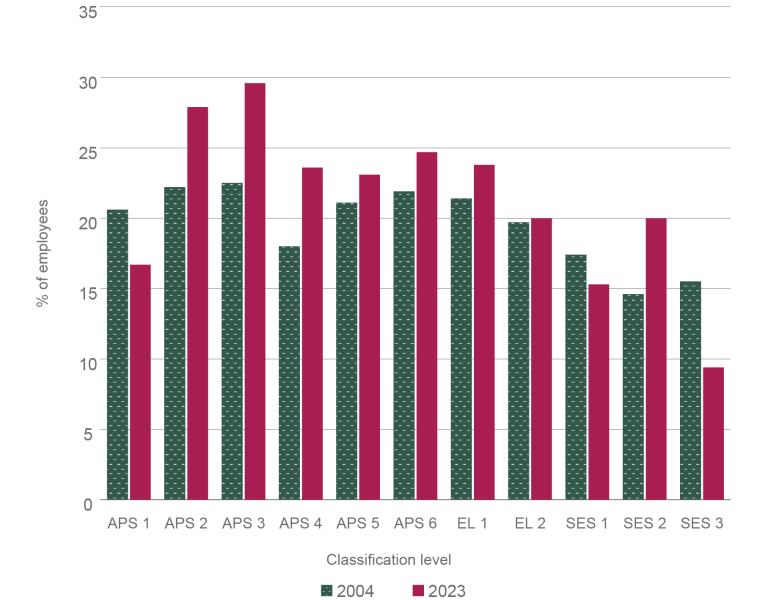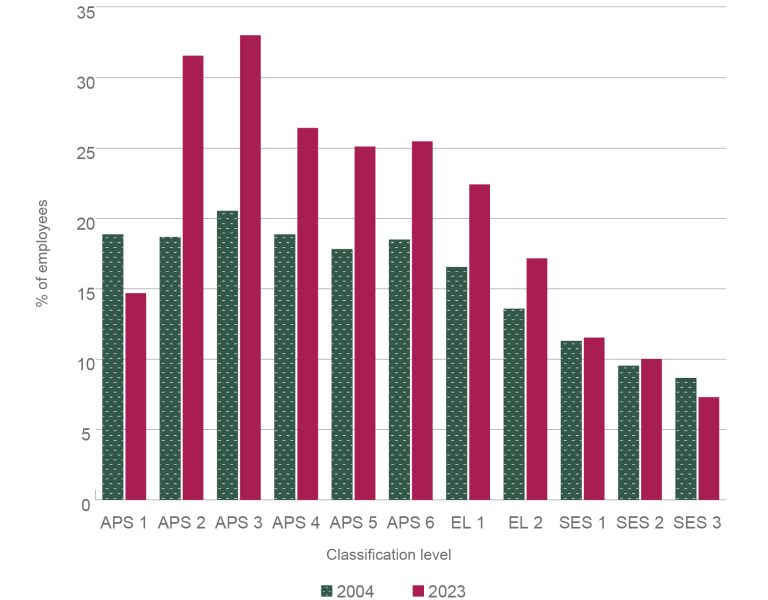APS cultural and linguistic diversity

A new Culturally and Linguistically Diverse (CALD) Employment Strategy for the Australian Public Service is being developed. The Australian Government asked the Australian Public Service Commission to lead this initiative in February 2023.
This strategy will provide practical ways to increase representation of CALD people at all levels of the APS. It will foster inclusive workplaces that provide opportunities for all. The strategy is being developed with extensive consultation and will be delivered in December 2023.
Employment data at 30 June 2023 shows that 24% of APS employees were born outside of Australia. While, overall, this proportion is comparable with the Australian workforce, the figure drops at senior levels. Senior Executive Service 1 and SES 3 levels have declined since 30 June 2004 (Figure 2.1).
Figure 2.1: Employees born outside of Australia (at 30 June)

Source: APS Employment Database (APSED)
Reflecting a similar trend for the same period, APS 2 to EL 2 classifications have seen increases in the proportion of employees whose first spoken language was not exclusively English (Figure 2.2). In contrast, SES cohorts have not changed significantly over this period.
Figure 2.2: Employees whose first spoken language was not exclusively English (at 30 June)

Source: APSED
In the 2023 APS Employee Census, perceptions of discrimination were lowest for respondents who reported as being from an Australian background. This includes those who described their cultural background as Australian along with one or more diverse cultural backgrounds. Higher rates of discrimination were reported by respondents from all other cultural backgrounds.
Key elements of the CALD Employment Strategy will be:
- promoting individual cultural capability across the APS to recruit and lead diverse teams
- improving key process points for recruitment, mobility and promotion
- developing an organisational culture that values diversity.
In-depth consultation took place to inform the development of the strategy, including:
- a survey with over 840 participants from all portfolio agencies
- analysis of transcripts from Listening Circles held by the Department of the Prime Minister and Cabinet with 97 employees from 24 agencies
- interviews with more than 50 individuals and organisations to hear personal and professional experiences.
External subject matter experts were consulted, and an extensive literature review undertaken.
The consultation process made it clear that the APS is not fully harnessing the skills and strengths that CALD employees bring. Systemic barriers for these employees are real. They make it more difficult for CALD people to enter the APS, be their whole selves at work, and advance their careers. Strong leadership and cultural literacy were identified as critical to achieving change.
Consultation also showed significant goodwill and curiosity from both CALD and non-CALD employees. This leads to many opportunities for enriching the work of the APS by better integrating diversity into all policies, programs and operations.
See also
Appendix 1 – APS workforce trends, State of the Service Report 2022–23.
Appendix 2 – State of the service additional data, State of the Service Report 2022–23
Australian Government (n.d.) APS Culturally and Linguistically Diverse Employment Strategy, APSC website, https://www.apsc.gov.au/working-aps/diversity-and-inclusion/diversity-inclusion-news/australian-public-service-aps-culturally-and-linguistically-diverse-employment-strategy, accessed 5 October 2023.



